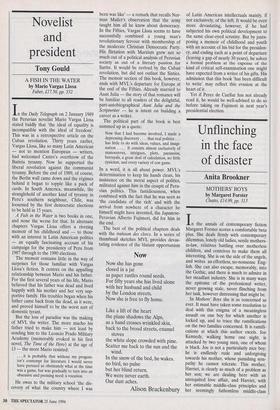Novelist and president
Tony Gould
A FISH IN THE WATER by Mario Vargas Llosa Faber, ┬Ż17.50, pp. 532 In the Daily Telegraph on 2 January 1989 the Peruvian novelist Mario Vargas Llosa stated baldly that 'the ideal of equality is incompatible with the ideal of freedom'. This was in a retrospective article on the Cuban revolution. Thirty years earlier, Vargas Llosa, like so many Latin American ŌĆö not to mention European ŌĆö writers, had welcomed Castro's overthrow of the Batista tyranny. Now he supported the liberal revolution against the communist tyranny. Before the end of 1989, of course, the Berlin wall came down and the regimes behind it began to topple like a pack of cards. In South America, meanwhile, the stranglehold of another kind of tyranny in Peru's southern neighbour, Chile, was loosened by the first democratic elections to be held in 15 years.
A Fish in the Water is two books in one, and none the worse for that. In alternate chapters Vargas Llosa offers a riveting memoir of his childhood and ŌĆö to those with an interest in Latin American politics ŌĆö an equally fascinating account of his campaign for the presidency of Peru from 1987 through to the 1990 elections.
The memoir contains little in the way of surprises for those familiar with Vargas Llosa's fiction. It centres on the appalling relationship between Mario and his father. For the first several years of his life, Mario believed that his father was dead and lived happily with his mother and her very sup- portive family. His troubles began when his father came back from the dead, as it were, and proved himself to be the worst sort of domestic tyrant.
But the loss of paradise was the making of MVL the writer. The more macho his father tried to make him ŌĆö not least by sending him to the Leoncio Prado Military Academy (memorably evoked in his first novel, The Time of the Hero) at the age of 13 ŌĆö the more Mario resisted: ... it is probable that without my progeni- tor's contempt for literature I would never have pursued so obstinately what at the time was a game, but was gradually to turn into an obsessive and pressing need: a vocation.
He owes to the military school 'the dis- covery of what the country where I was born was like' ŌĆö a remark that recalls Nor- man Mailer's observation that the army taught him all he knew about democracy. In the Fifties, Vargas Llosa seems to have successfully combined a young man's revolutionary fervour with membership of the moderate Christian Democratic Party. His flirtation with Marxism grew not so much out of a political analysis of Peruvian society as out of a literary passion for Sartre. It would be revived by the Cuban revolution, but did not outlast the Sixties. The memoir section of this book, however, ends with MVL's departure for Europe at the end of the Fifties. Already married to Aunt Julia ŌĆö the story of that romance will be familiar to all readers of the delightful, part-autobiographical Aunt Julia and the Scriptwriter ŌĆö he is intent on building a career as a writer.
The political part of the book is best summed up in a quote:
Now that I had become involved, I made a depressing discovery . . . that real politics . . . has little to do with ideas, values, and imagi- nation . . . . It consists almost exclusively of manoeuvres, intrigues, plots, paranoias, betrayals, a great deal of calculation, no little cynicism, and every variety of con game.
In a word, it is all about power. MVL's determination to keep his hands clean, his insistence on the moral aspect of politics, militated against him in the Cesspit of Peru- vian politics. This fastidiousness, when combined with the fact that he was seen as `the candidate of the rich' and with the arrival from nowhere of a character he himself might have invented, the Japanese- Peruvian Alberto Fujimori, did for him in the end.
The best of the political chapters deals with the trahison des clercs. In a series of thumbnail sketches MVL provides devas- tating evidence of the blatant opportunism of Latin American intellectuals mainly, if not exclusively, of the left. It would be even more devastating, however, if he had subjected his own political development to the same clear-eyed scrutiny. But by juxta- posing a memoir of childhood and youth with an account of his bid for the presiden- cy, and ending each at a point of departure (leaving a gap of nearly 30 years), he solves a formal problem at the expense of the kind of critical self-examination one might have expected from a writer of his gifts. His admission that this book 'has been difficult to write' may reflect this evasion at the heart of it.
Yet if Perez de Cuellar has not already read it, he would be well-advised to do so before taking on Fujimori in next year's presidential election.
































































 Previous page
Previous page